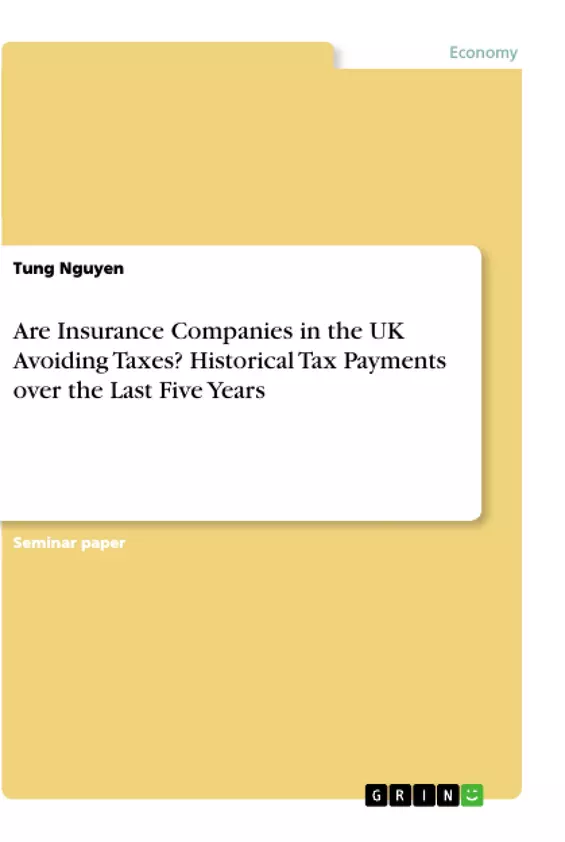In this analysis, historical tax payment in the last five years (from 2011 to 2015) of ten insurance companies in the UK are investigated and analysed thoroughly in order to answer the question, whether they were evading taxes over the course of this time period. All of these companies are among the top 14 insurance companies in the UK in terms of assets.
In the current age of expanding globalisation and increasing international integration, large corporations and individuals may hold stream of incomes and expenses in multiple countries with different legislation all around the globe. As a result, the matter of tax practices become more and more complicated. In the case of insurance companies, the issue becomes even more complicated due to the nature and characteristics of the streams of income and expense in this industry. Despite advanced complicated tax legislation in developed nations and reports by specialists, the concern for whether companies such as insurance companies are avoiding taxes or not is growing.
In order to answer the aforementioned question, firstly, a quick overview over an important study of tax payments and the definition of so-called tax heavens are given. Secondly, the work's methodology, which is mainly based on the analysis of profitability ratios and linear regression analysis is laid out. Lastly, the results of the analysis are discussed and put into context.
Inhaltsverzeichnis (Table of Contents)
- Introduction
- Literature research
- Study on tax practice
- Tax havens
- Methodology
- Tax and profitability ratios
- Linear regression analysis
- Limitations
- Results and discussion
- Subsidiaries in tax havens
- Tax and profitability ratios analysis
- Linear regression analysis
Zielsetzung und Themenschwerpunkte (Objectives and Key Themes)
This research paper examines the tax avoidance practices of insurance companies in the United Kingdom. The study aims to investigate the relationship between tax avoidance and profitability, and explore the role of subsidiaries in tax havens.
- Tax avoidance strategies employed by insurance companies in the UK
- The impact of tax avoidance on corporate profitability
- The role of subsidiaries in tax havens in facilitating tax avoidance
- The effectiveness of existing tax regulations in deterring tax avoidance
- Potential implications for the insurance industry and the UK economy
Zusammenfassung der Kapitel (Chapter Summaries)
- Introduction: This chapter provides an overview of the research topic, outlining the significance of tax avoidance in the insurance industry. It also defines key concepts and presents the objectives of the study.
- Literature Research: This chapter reviews existing literature on tax avoidance practices in the insurance sector, focusing on studies examining tax practice and the use of tax havens. It provides a theoretical framework for the research.
- Methodology: This chapter describes the research methodology employed in the study. It outlines the data collection and analysis techniques, including the use of tax and profitability ratios and linear regression analysis.
- Results and Discussion: This chapter presents the findings of the study and discusses their implications. It examines the relationship between tax avoidance and profitability, analyzes the role of subsidiaries in tax havens, and evaluates the effectiveness of existing regulations.
Schlüsselwörter (Keywords)
Tax avoidance, insurance companies, UK, profitability, tax havens, subsidiaries, linear regression analysis, tax and profitability ratios, corporate tax.
- Quote paper
- Tung Nguyen (Author), 2017, Are Insurance Companies in the UK Avoiding Taxes? Historical Tax Payments over the Last Five Years, Munich, GRIN Verlag, https://www.grin.com/document/536417



